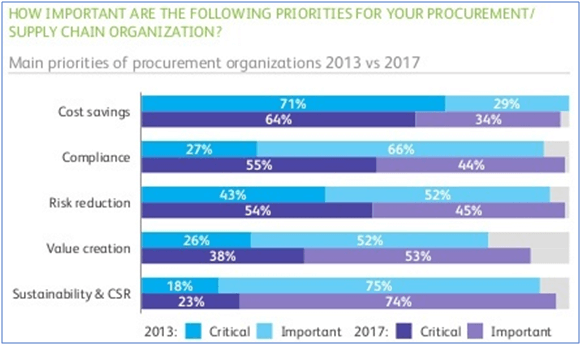Sustainable procurement has been introduced to a public and private organization for decades and it has now become a “must have” key element to integrate in business strategy for company competitive advantages and sustainable development.
The survey conducted by EcoVadis and HEC about the results attribute to Sustainable Procurement program showed 76% of the procurement leader acknowledged that adopting sustainable procurement contribute to improved brand reputation. Barometer author cited “consumers are largely driving corporate demand for sustainability and quality produced products”. Sustainable procurement undoubtedly gives a positive impact on company revenue growth and protecting brand reputation in the long run.

Table of Contents
Priorities for Sustainable Procurement
The chart below shows there is a sharp increase of compliance moving up to 28% from 27% to 55%, it has overtaken risk reduction which gained 11% based on 2013 vs 2017 result. The survey outcome shows that compliance, risk reduction and cost savings remain as the main priorities when developing organization business strategy and procurement strategy. The question on how to implement it together successfully and produce the desired result is a challenge for the corporate leader.

A new international standard published in April 2017, “ISO 20400: Sustainable procurement – Guidance”, is being created to provide guidance on how sustainability integrates into procurement at a strategic level; Integrate sustainability considerations into the procurement process. The publication detailed the key considerations for sustainable procurement.
Managing Risks to Procurement
Procurement team should have the ability to understand and align the procurement goal with the organizational sustainability policy and strategies. Risk management requires to identify, audit and manage internal and external risks related to procurement practices. The process includes risk analysis, risk assessment and risk mitigation. Risk analysis identifying the potential risks and opportunity, determine its impact which could possibly affect the company overall profit. For example, analysis of all costs and supply disruption; Identity opportunity – future trends in the supply market, explore the new business opportunity, search for innovation on circular economy concept product. The risk assessment process is for controlling and to mitigate the risk, act to reduce the risk by developing corrective and improvement action plan, bind it into governance and procurement policy.
These processes are extremely important to the organization in a constantly changing business environment, the procurement team is responsible for continuously identifying, assessing the risk and opportunity related to company competitive advantages.
Addressing Adverse Impacts through Due Diligence
Procurement practices or the activities of suppliers, business partners and contractors can cause adverse sustainability impacts. The organization is accountable to identify, prevent and to remediate them. Clear accountability should be defined from the top management level to the procurement team, while roles and responsibilities to be clearly communicated to an individual who is responsible for the procurement process. This allows each staff to focus on their job and perform their duty diligently.
Setting Priorities for Sustainability Issues
Mapping supplier related to critical sustainability issues. Being prioritize relevant and significant sustainability issue. Outline possible procurement actions and report the issue to organization top management for developing strategies to manage the situation. Relevance is to categorize relevant sustainability issues which might possible happened to an organization and its supplier. Connect sustainability core subject and sustainability issue when developing procurement policy. The core subjects are organizational governance, human rights, labor practices, the environment, fair operating practices, consumer issues, and community involvement. The significance is to analyze relevant sustainability issues which have the most impact by the organization activities and decisions. The consideration linked to intensity, frequency of occurrence, direct and indirect financial impact for failing to act. For example, the food processing industry could encounter high impact on child labor or forced labor and food safety, low impact on animal welfare, water usage, and waste.
Exercising Influence
An organization should know how to exercise its power to influence suppliers and stakeholders’ decisions or behaviors towards sustainability. The influence can be derived from the degree of relationship developed between the organization and the supplier, organization’s sphere of influence of business in the industry, contract term, the benefit for the supplier for working with the organization, the ability of the organization to collaborate with industry peers. Example, Kellogg’s Origins projects work with their farmers to implement sustainable agriculture practices focusing on reducing environmental impact, improve livelihoods and positively impact families and communities.
The influence can be extended to engage government or other influential international organization to improve the performance through public policies, act, and legislation. For example: To strive for sustainable change in the waste management value chain, PepsiCo engaged in strategic partnerships with global initiatives and NGO focused on improved recycling and supporting a circular economy.
The full content is only visible to SIPMM members
Already a member? Please Login to continue reading.
References
Cathy Berry. (2017). “ISO 20400 and BS8903 A Comparison of Sustainable Procurement Guidance Standards”. Retrieved from: https://www.iso20400.org/documents/pdf_iso_20400_and_bs8903_comparison_overview.pdf, accessed 10/03/2019.
Jagdish Sheth, Suhas Apte. (2017). “Seven Steps to Sustainable Procurement”. Retrieved from: http://www.apics.org/apics-for-individuals/apics-magazine-home/magazine-detail-page/2017/11/01/seven-steps-to-sustainable-procurement, accessed 07/03/2019.
Kelli Barrett. (2017). “Corporate Procurement Officers Say Sustainability Now Key Criteria for Purchases”. Retrieved from: http://www.ecosystemmarketplace.com/articles/corporate-procurement-officers-say-sustainability-now-key-criteria-purchases/, accessed 07/03/2019.
Khoo Chai Luan, DPSM. (2018). “Overcoming Key Challenges of Sustainable Procurement Practices”. Retrieved from SIPMM: https://publication.sipmm.edu.sg/overcoming-key-challenges-sustainable-procurement-practices/, accessed 07 Mar 2019.
Oliver Bruel, Olivier Menuet, Pierre-Francois Thaler. (2017). “Scaling Up Sustainable Procurement: A New Phase of Expansion Must Begin”. Retrieved from https://www.hec.edu/en/news-room/state-sustainable-procurement-latest-ecovadis/hec-paris-barometer-released, accessed 06/03/2019.
Project Committee ISO/PC 277. (2017). “ISO 20400 Sustainable procurement -Guidance”. Retrieved from: http://gpp.golocal-ukraine.com/wp-content/uploads/ISO_20400_2017E-Character_PDF_document.pdf, accessed 07/03/2019.
Thijs WillaertI. (2016). “Sustainable Procurement: What You Need to Know About the New ISO 20400 Standard”. https://www.dqsglobal.com/intl/, accessed 10/03/2019.
Winky Lim, ADPMM. (2017). “Ensuring Sustainable Practices in Procurement for Effective Supply Management”. Retrieved from SIPMM: https://publication.sipmm.edu.sg/ensuring-sustainable-practices-in-procurement-for-effective-supply-management/, accessed 07/03/2019.

